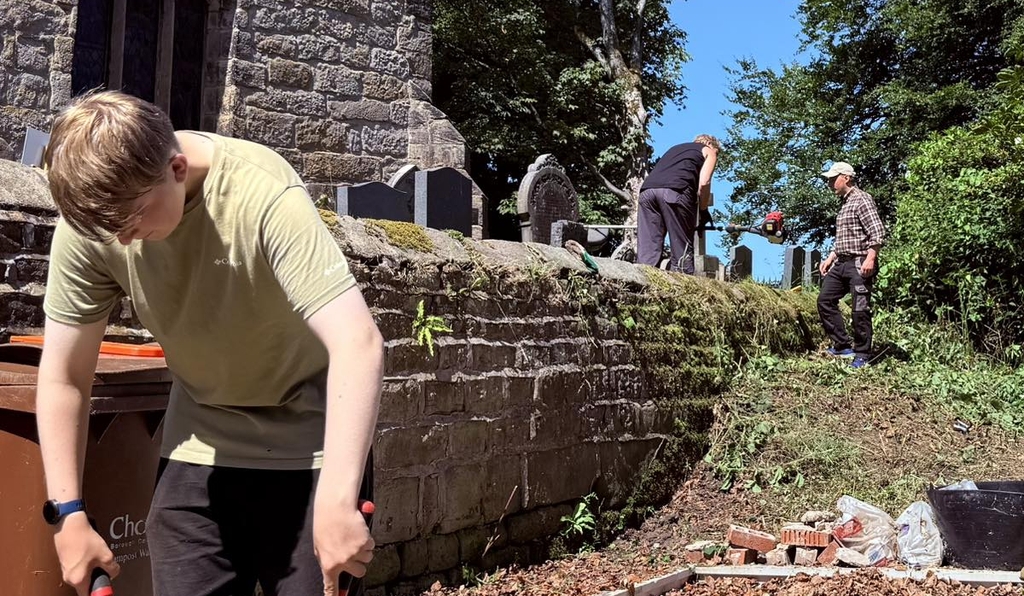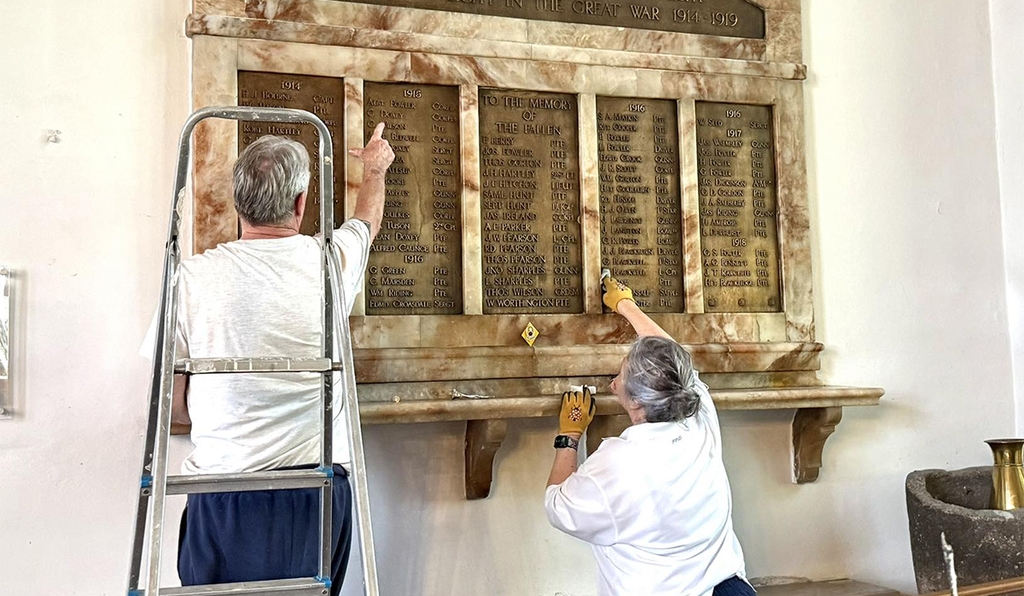Dear Friends,
Today is 15th March, the third Sunday in Lent and the third Sunday we have heard Paul’s words to the Corinthians; the third week of our exploring ‘Growing in Grace’.
On Ash Wednesday our very own James Mawdesley commenced our Lent series by reflecting on Paul’s words, ‘As poor, yet making many rich, as having nothing and yet possessing everything’. He reflected on how apt these words were as we consider how to place our parish on a sustainable financial footing. For Paul, preaching the Gospel of Jesus was everything, so why would financial collection be so important to him?
Paul doesn’t focus on asking people to give to a particular need. We are all familiar with demands, aren’t we? I am sure many of us watched Sport Relief on television and contributed because of the emotional stories that encouraged people to give over £40 million.
But Paul’s main emphasis in 2 Corinthians 8 and 9 is upon the ‘supply-side’ of the equation. Paul wants to grow mature obedient givers, not extract one-off gifts from emotional givers moved by the plight of people far away. For Paul, the collection is more than a charitable act, but a sign, even a sacrament, of mutuality between churches, between Jew and Gentile, between apostle and churches.
The offering Paul talks about is much more than money; it is about relationships in the Church. Practising generosity was vital to the spiritual growth and maturity of the Corinthian Church. For Paul, offering was symbolic of the unity of Jew and Gentile, an area in which Paul had experienced much tension. It was about relationships within the growing Church. It was less about what the need was, but very much about our need as humans to give.
In a world of social media and emails, personal relationships can seem less important. We have friends we have never met and never intend to meet. However, we quickly miss out on qualities only demonstrated when we encounter one another. Titus is a volunteer. Paul had not been entirely sure of his commitment, but Titus has proved more enthusiastic than Paul dared hope.
At St. James’ is an entire army of volunteers, like Titus. They provide the refreshments, count the collection, clean the Church, manage the graveyard, welcome you in, read the scripture, write the prayers, ring the bells, manage the finances, visit the sick and much more. Like Titus, there is no sense of duty, but eagerness for the Gospel. Like Titus and the brother, our volunteers show enthusiasm for the Good News, and so an administrative task becomes a demonstration of gospel love.
Paul writes, ‘We intend to do what is right not only in the Lord’s sight but also in the sight of others’. Let’s reflect on this sentence. The commitment is, ‘First to the Lord.’
Paul is concerned for both his reputation and the reputation of the Church. The Christian Church often does not have a reputation for generosity or integrity. Churches are perceived to be more concerned with asking for money than giving. True Christians and Christian churches are here to demonstrate the truth of the love of God - received and shared.
During Lent at St.James,’ we consider how the church building and those who worship here could benefit from such a demonstration of love. I am continually brought back to the fact that today and over the coming weeks, we will be called to demonstrate the love of God more than ever. Not just for us, our church family, but because of the current crisis relating to Coronavirus Covid19.
Yesterday I prayed to our Lord, I said,
I’m praying for all those who are or might be severely affected by this new virus.
I can’t help but be worried about my elderly mum and all my elderly friends; some of whom are behind closed doors of nursing homes unable to receive visitors.
I am praying Lord that they are not distressed, upset and confused when they don’t see their loved ones for a while.
I’m praying Lord that those families who have lost loved ones are comforted and supported in their grief.
I am praying Lord that the sensible precautions we are all advised to take will reduce the incidences of the illness.
I am praying Lord that the majority of the population that do contract the virus recover quickly.
I am praying Lord for those scientists involved in developing a vaccine.
And I am especially praying for all those in medical and caring professions who are giving their time and talent to looking after those people affected.
I am praying Lord for humankind in its response to the need to take precautions and the possibility that these will get more stringent in the coming weeks.
I hadn’t realised how important shaking hands in greeting was. I had not realised how bereft I would feel when a normally tactile friend said to me, ‘I’m keeping my hands behind my back, so no hug or kiss on the cheek.’ I had not realised how much I looked forward to and enjoyed a cup of tea and a biscuit with my church family on a Sunday. I hadn’t appreciated how vital it is to be with other people.
Social interaction and physical contact and sharing of things is - for me - a fundamental need. It is for me a demonstration of generosity, it is a blessing, and I am sad about it being taken away, albeit temporarily, and for good and sensible reasons. I am the poorer for it and poor because of the lack of it.
Do any of you listen to Radio 4’s Desert Island Discs? It’s on at 11 a.m. on Sunday and repeated during the week, or you can catch it on BBC iPlayer. This week it’s Harry Potter himself, the actor Daniel Radcliffe. The programme has been on the go since 1942, and there are over 3,000 episodes. Each week a guest, called a ‘castaway’ is asked to choose eight recordings (usually, but not always music), a book and a luxury item they would take if they were to be cast away on a desert island while discussing their lives and the reasons for their choices. They get the Bible and the full works of Shakespeare as standard. Guests talk about their family (parents, children, relatives, siblings and pets often feature); their purpose in life (work, career, fundraising, being a parent…), their faith, whether that’s Christianity or another religion or a spiritual approach to life.
The programme is all about connections, links, between the recording chosen and the castaway. The castaway reflects on what is important to them. When imagining stripped of everything they know, alone on a desert island, their thoughts gravitate towards their relationships, towards the personal contacts that are important to them that they will miss. Their choice of one recording, one book and one luxury item reflects their need to stay connected, to retain the memory and the emotions and feelings that go with that memory that connects them to their loved ones, their lives and their beliefs.
Perhaps it is a little prophetic that we are now asked to keep our social distance and in some cases isolate ourselves completely. Has this coincided with Lent? It wasn’t Jesus’ idea to go into the wilderness; it was his Father’s. It was the spirit of God which “led” him into the wilderness. Yet the spirit of God was with Jesus every moment of every one of those forty days and nights. At no time did his Father ever desert him or leave him alone. God was always with His son. Jesus walked, from the time of his baptism by John, in the spiritual awareness of his Father’s love and delight in him. It was in the wilderness, away from people, that Jesus not only powerfully drew close to his Father, but also stood against the devil and defeated him.
Are we as Christians being challenged to respond to the impact of Covid19 in a generous way? Could we use our time in this health crisis wilderness to reflect and accept God’s Grace, to experience and know his love of us, his benevolence, his blessings and his generosity and could we grow in that grace? Can we know that God the Father is always with us, he never leaves us, and His Father’s love is manifest even though we can’t see or touch him?
Our Gospel reading brings us the Samaritan woman at the well. This woman is no angel, and she has quite a reputation. This short passage illustrates that a well of grace is ready to refresh the soul parched by sin and suffering. And that Jesus comes to save the sick and serve those who need physical and spiritual healing. The Samaritan woman has her sins washed away by Jesus, who offers her divine mercy in the living water of grace, which washes away sins and cleanses souls. The woman went to the well to get a jug of water. Instead, she got much more, including a cleansed and refreshed spiritual life.
How then can we benefit from the water of grace? How then can we benefit from a cleansed and refreshed spiritual life?
I don’t know what your answer will be to this question, nor do I know what your response to being in the wilderness will be either. I can only hope that you listen and hear Christ’s words through the Gospel. I can only hope that you receive and accept the living water, the water of grace.
The generosity of Jesus is a gracious gift. It is also a gracious challenge for our own Christian lives, especially when faced with a worldwide health crisis. But perhaps we can respond graciously? Maybe we can be generous?
The shelves in the shops have been stripped bare of paracetamol, toilet rolls, eggs, even long-life milk. I understand peoples' need to be prepared, to protect themselves, to be ready, of course, I do. Yet as Christians, could we respond more graciously, could we take less and share more? Could we respond to God’s Grace with our own gracious and open generosity like Titus and the Samaritan woman? Could we demonstrate the love of God we have received and share?
While we may not be able to shake hands during the peace, we can still offer a sign to those next to us, in front of us, behind us, those on the other side of the Church, we can still emotionally connect. While there is no tea or coffee to drink, we don’t need to rush off at the end of the service we can still stay and chat and share our news, our concerns; we can still build relationships and we can still be Church.
And if in the coming weeks we are asked to be more physically isolated, we can still have a personal contact through social media, Facebook, Twitter, FaceTime, Skype, email and phone. God-given technology that will allow us to have the personal connection that Titus demonstrates is so vital in our Christian lives. Let us stay connected and care for each other and experience true giving as an act of self-liberation, as one of the significant achievements of our life.
Jesus said, ‘Everyone who drinks of this water will be thirsty again, but those who drink of the water that I will give them will never be thirsty. The water that I will give will become in them a spring of water gushing up to eternal life.’
Amen.
Sam Nicol
























